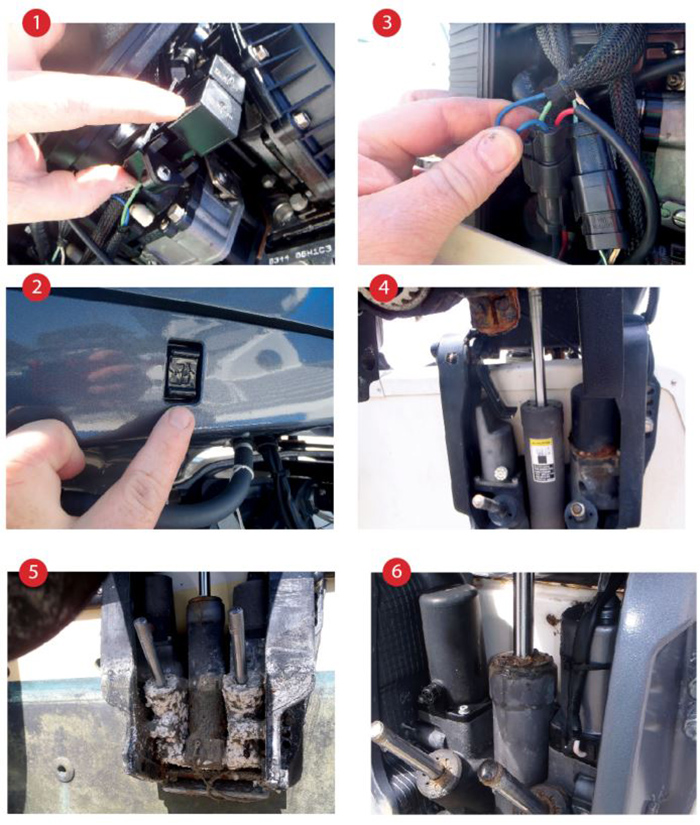Are you tired of your boating plans getting derailed by a stubborn Mercury boat motor? You’re not alone.
Many boat enthusiasts face similar frustrations, but the good news is that you can tackle these issues with the right guidance. Imagine gliding smoothly across the water, confident that your motor won’t let you down. You’ll discover straightforward troubleshooting tips that can transform your boating experience.
Say goodbye to unexpected breakdowns and hello to more time on the water. Let’s dive into the solutions that will help you get back to what you love most—enjoying the open seas.
Common Issues With Mercury Boat Motors
Mercury boat motors are popular for their power and reliability. Yet, they can face issues affecting performance and safety. Understanding these problems helps maintain your boat’s engine. This section covers some frequent troubles you might encounter.
Starting Problems
Starting issues can frustrate boaters. A dead battery is a common cause. Regularly check the battery for corrosion or loose connections. Another issue is a faulty ignition switch. Ensure the switch is working properly. A clogged fuel filter may also prevent starting. Replace it as needed for smooth operation.
Overheating Concerns
Overheating can damage your Mercury motor. Low coolant levels often lead to overheating. Check coolant levels frequently and refill as needed. A broken thermostat might cause the engine to run hot. Inspect the thermostat and replace it if necessary. Blocked water intake can also cause overheating. Ensure the intake is clear of debris.
Fuel System Troubles
Fuel system issues affect engine performance. A dirty fuel injector can lead to poor fuel delivery. Clean the injectors regularly for optimal flow. A damaged fuel pump disrupts fuel supply. Test the pump’s pressure and replace it if damaged. Air leaks in fuel lines may cause sputtering. Inspect the lines and fix any leaks promptly.

Credit: algonamarine.com
Diagnosing Electrical Problems
Diagnosing electrical problems in your Mercury boat motor can seem daunting. But understanding the basics can make it manageable and even rewarding. Electrical issues often boil down to a few key components, and with a systematic approach, you can pinpoint problems effectively. Are you ready to roll up your sleeves and dive in? Let’s tackle those electrical challenges head-on!
Battery And Wiring Checks
The battery is the heart of your boat’s electrical system. Start by checking its condition. Is it fully charged? Look for corrosion on the terminals; a simple cleaning might restore connections.
Next, examine the wiring. Inspect for frayed wires or loose connections. Sometimes, a quick tightening or a patch-up can resolve issues. Remember, even a single faulty wire can disrupt your boat’s performance.
If you’ve ever been stranded on the water due to a dead battery, you know the importance of regular checks. So, why not make it a habit to inspect your battery and wiring before every trip?
Ignition System Analysis
The ignition system is crucial for starting your boat motor smoothly. Begin by examining the spark plugs. Are they clean and properly gapped? A worn-out spark plug can lead to poor engine performance.
Also, check the ignition coils. They provide the necessary voltage to the spark plugs. If your engine is sputtering or failing to start, a faulty coil might be the culprit.
Consider the ignition switch too. Is it responsive and secure? Loose connections here can prevent the motor from starting altogether. Have you ever turned the key, only to hear silence? It’s a frustrating experience, but a thorough ignition system check can prevent this.
Now, think about your last troubleshooting adventure. Did you find yourself wishing you’d caught the problem sooner? Regular maintenance can save you time and headaches. So, next time you hit the water, ensure your electrical systems are in top shape!
Addressing Performance Issues
When your Mercury boat motor isn’t performing as expected, it can quickly turn a day of leisure into a source of frustration. Understanding how to address performance issues can save you time, money, and stress. Let’s dive into specific solutions that can get your boat motor running smoothly again.
Power Loss Solutions
Experiencing power loss in your Mercury boat motor can be disappointing, especially when you’re out on the water. One common cause is a clogged fuel filter. Regularly check and replace your fuel filter to ensure a steady flow of clean fuel to your engine.
Another potential issue is a faulty spark plug. Inspect your spark plugs for wear or damage. A simple replacement might restore your motor’s performance.
Have you considered the quality of your fuel? Using old or contaminated fuel can lead to power loss. Make it a habit to use fresh, high-quality fuel and add a fuel stabilizer if your boat will sit unused for extended periods.
Vibration And Noise Reduction
Vibration and noise can be more than just a nuisance—they might indicate underlying problems. One solution is to check the propeller for damage or debris. Even small nicks or entanglements can cause significant vibration. Clean or replace your propeller as needed.
Loose engine mounts are another common culprit of excessive vibration. Tighten or replace engine mounts to ensure your motor is securely fastened.
Could the noise be coming from the drive belt? Inspect your drive belt for signs of wear or misalignment. A quick adjustment or replacement can significantly reduce noise.
Addressing these issues not only improves your boating experience but also extends the life of your motor. Have you ever encountered these problems? What solutions worked for you? Share your experiences in the comments below and help fellow boaters keep their motors in top shape.
Maintenance Tips For Optimal Function
Maintaining your Mercury boat motor ensures smooth sailing and extends its life. Regular upkeep prevents unexpected breakdowns and costly repairs. Simple maintenance steps keep your engine in top shape, providing peace of mind on the water.
Routine Engine Inspections
Check your engine regularly for signs of wear or damage. Examine belts for cracks and replace them if necessary. Inspect fuel lines for leaks or brittleness. Ensure that connections are tight and corrosion-free. Look for any unusual noises or vibrations while the engine runs.
Proper Lubrication Techniques
Lubrication keeps your engine running smoothly. Use the recommended oil for your Mercury motor. Change the oil every 100 hours or annually. Grease fittings on the engine and propeller shaft regularly. This prevents rust and ensures smooth operation.
Expert Repair Techniques
Troubleshooting Mercury boat motors requires a keen understanding of common issues. Experts focus on identifying fuel line blockages and electrical system faults. Efficient diagnosis and repair ensure smooth sailing and optimal performance on the water.
If you’ve ever been on a boating adventure only to find your Mercury boat motor sputtering or refusing to start, you understand the frustration. Knowing expert repair techniques can save your day. Whether you’re a DIY enthusiast or prefer professional services, having the right know-how and tools is crucial for effective troubleshooting.Diy Vs Professional Services
Deciding whether to tackle the repair yourself or call in a professional can be a tough choice. If you enjoy hands-on projects and have some mechanical skills, DIY repairs can be both satisfying and cost-effective. On the other hand, complex issues might need a professional’s touch to ensure your motor’s longevity and performance. Consider the time and expertise required for the repair. Basic tasks like changing spark plugs or checking the fuel system can often be handled at home. However, if you find yourself in uncharted waters with electrical problems or complicated mechanical failures, a professional can provide peace of mind and save you from potential mishaps.Choosing The Right Tools
Having the right tools can make all the difference in your troubleshooting journey. A basic toolkit should include a set of screwdrivers, wrenches, and pliers. Specialized tools, like a multimeter for electrical diagnostics or a compression tester, can be invaluable for deeper issues. Think about the specific problem you’re facing. For example, if your motor isn’t starting, a fuel pressure gauge might help identify a clogged fuel line. Investing in quality tools not only saves time but also ensures the job is done right. Have you ever had that moment when you realize you’re missing a crucial tool mid-repair? Having a well-stocked toolkit can prevent such frustrations and keep your repair process smooth and efficient. It’s always worth the effort to prepare for the unexpected on your boating escapades.
Credit: www.boatus.com
Preventive Measures
Regular checks of the fuel system can prevent Mercury boat motor issues. Inspecting spark plugs ensures efficient engine performance. Maintaining the cooling system helps avoid overheating problems.
Preventive measures can save you from unexpected boat motor troubles. Regular maintenance keeps your Mercury boat motor running smoothly. It ensures longevity and efficiency.Regular Check-ups
Schedule regular check-ups to ensure optimal performance. Inspect the motor for any signs of wear or damage. Check oil levels and replace old oil. Clean the fuel system to prevent blockages. Inspect belts and hoses for cracks or wear. Regular check-ups can prevent costly repairs.Winterizing Your Boat Motor
Winterizing your motor protects it during cold months. Drain water from the engine to avoid freezing. Use antifreeze to safeguard internal components. Clean the motor thoroughly. Apply a protective layer to prevent rust. Store the boat in a dry place. Proper winterization prolongs the motor’s life.Resources For Further Assistance
Troubleshooting Mercury boat motors can be challenging. Finding the right support is crucial. Whether facing a minor issue or a complex problem, effective resources can make a difference. Explore various avenues to get the help you need.
Online Forums And Communities
Online forums are rich with shared experiences. Boat owners discuss issues and solutions. Websites like The Hull Truth offer valuable insights. These communities are full of enthusiasts and experts. They often provide practical advice and troubleshooting tips. Engaging with these forums can be rewarding. You can ask questions and get real-time feedback. Reading through threads can also be enlightening. You might find someone with a similar issue.
Manufacturer Support Services
Contacting Mercury’s support services can be beneficial. They offer direct help and guidance. The manufacturer’s website contains useful resources. You can find manuals and troubleshooting guides. Support representatives can answer specific queries. They are equipped to deal with technical issues. Many times, they can guide you through step-by-step solutions. This ensures accurate and reliable assistance.

Credit: www.youtube.com
Conclusion
Troubleshooting Mercury boat motors can seem tough, but it gets easier. Start with the basics like checking fuel and spark plugs. Listen for unusual sounds. Look for leaks or blockages. Regular maintenance helps prevent many problems. Always consult the manual for specific guidance.
Asking experts or joining online forums can offer more help. With patience and practice, you’ll handle common issues confidently. Safe boating depends on a well-maintained engine. So, take the time to understand your motor’s needs. Happy boating!






